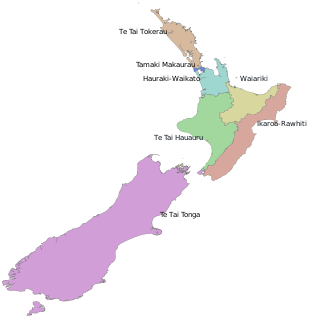
Dame Tariana Turia is a New Zealand politician. She gained considerable prominence during the foreshore and seabed controversy, and eventually broke with her party as a result. She resigned from parliament, and successfully contested a by-election in her former electorate as a candidate of the newly formed Māori Party. She retired from Parliament in 2014.

The Māori Party is an indigenous rights-based centre-left political party in New Zealand. Tariana Turia founded the party in 2004 after resigning from the governing centre-left Labour Party, in which she was a minister, over the foreshore and seabed ownership controversy. She and Pita Sharples, a high-profile academic, became the first co-leaders.

In New Zealand politics, Māori electorates, colloquially known as the Māori seats, are a special category of electorate that gives reserved positions to representatives of Māori in the New Zealand Parliament. Every area in New Zealand is covered by both a general and a Māori electorate; as of 2002, there are seven Māori electorates. Since 1967 candidates in Māori electorates have not needed to be Māori themselves, but to register as a voter in the Māori electorates people need to declare they are of Māori descent.
The Kiwi Party was a political party operating in New Zealand between 2007 and 2011. Briefly known as Future New Zealand, it was a breakaway from the United Future New Zealand party and sought to carry on the tradition of Future New Zealand. The party was formed when MP Gordon Copeland left United Future after a dispute over support for the Crimes Amendment Act 2007. At the 2008 general election, the Kiwi Party was unsuccessful, and was not re-elected to Parliament. It did not contest the 2011 general election under its own banner, but the leaders and other members stood for the Conservative Party.

Hone Pani Tamati Waka Nene Harawira is a New Zealand Māori activist and former parliamentarian. He was elected to the New Zealand Parliament for the Māori electorate of Te Tai Tokerau in the 2005 general election as the Māori Party candidate. His resignation caused the Te Tai Tokerau by-election, held on 25 June 2011, which he won with a majority of 1117. As Leader of the Mana Movement and Member of Parliament for Te Tai Tokerau, he sat on the front bench in the New Zealand House of Representatives until losing the seat in the 2014 general election.

The Direct Democracy Party (DDP) of New Zealand (2005–2009) was a political party in New Zealand that promoted greater participation by the people in the decision-making of government. The party's leader was Kelvyn Alp.
The Nga Iwi Morehu Movement was a New Zealand Māori political party. Its name literally translates as "the surviving people" or "the remnant people". It contested the 1996 election as an unregistered party, running a single candidate and gaining 194 votes. It ran two candidates in the 2002 election, winning 522 votes. In the 1999 election, members of Nga Iwi Morehu stood under the banner of the Freedom Movement.

Te Tai Tokerau is a New Zealand parliamentary Māori electorate that was created out of the Northern Maori electorate ahead of the first Mixed Member Proportional (MMP) election in 1996. It was first held by Tau Henare representing New Zealand First for one term, and then Dover Samuels of the Labour Party for two terms. From 2005 to 2014, it was held by MP Hone Harawira. Initially a member of the Māori Party, Harawira resigned from both the party and then Parliament, causing the 2011 by-election. He was returned under the Mana Party banner in July 2011 and confirmed at the November 2011 general election. In the 2014 election, he was beaten by Labour's Kelvin Davis, ending the representation of the Mana Party in Parliament.
Kelvyn Alp is a New Zealand politician and activist. Alp was the leader of the Direct Democracy Party of New Zealand which stood in the 2005 general elections. He also stood for Mayor of Manukau City in 2007. Alp stood in the 2011 Te Tai Tokerau by-election under the OurNZ Party banner receiving 0.5% of the vote. He served in the New Zealand Army from 1995 to 1996.
The Hapu Party was a Māori political party in New Zealand that was formed in August 2008 and contested the Te Tai Tokerau seat in the 2008 general election. The party was led by David Rankin, a leader of the Matarahurahu hapū of Northland.

The 2011 New Zealand general election on Saturday 26 November 2011 determined the membership of the 50th New Zealand Parliament.

Kelvin Glen Davis is a New Zealand politician and a member of the House of Representatives who has served as Deputy Leader of the Labour Party since 1 August 2017.

The 2014 New Zealand general election took place on Saturday 20 September 2014 to determine the membership of the 51st New Zealand Parliament.
The Mana Movement, formerly known as the Mana Party, is a New Zealand political party led by Hone Harawira which was formed in April 2011 following his resignation from the Māori Party. Harawira won the by-election in Te Tai Tokerau of 25 June 2011 for the Mana Party and retained the seat during the 2011 general election, but lost it in 2014 and 2017 to Labour Party candidate Kelvin Davis.

The 2011 Te Tai Tokerau by-election was a by-election in the New Zealand electorate of Te Tai Tokerau that was caused by Hone Harawira's resignation from the seat. He chose to re-contest it with the Mana Party in order to seek a new mandate for his views. After generating several days of media interest and criticism Harawira announced on 4 May 2011 that he was delaying his resignation in order to consult his supporters in his electorate. On 11 May 2011 Harawira wrote to the Speaker of the House to resign from Parliament, with effect from 20 May 2011. On 12 May 2011 the Prime Minister John Key announced that the by-election would be held on 25 June.

The Opportunities Party is a centrist political party based in New Zealand. It was founded in 2016 by economist and philanthropist Gareth Morgan. The party is based upon an idea of "evidence-based" policy with 17 policies made up of four selected pillars of "Environment Front and Centre", "The Cost of Housing Must Come Down", "Universal Basic Income (UBI)" and "The Opportunity to Thrive".

The 2020 New Zealand general election will be held after the currently elected 52nd New Zealand Parliament is dissolved or expires. Prime Minister Jacinda Ardern has announced the election date as Saturday 19 September 2020.

The Advance New Zealand Party is a political party in New Zealand led by MP Jami-Lee Ross. The idea was first unveiled in a newsletter from Ross released in April 2020. The party would be a broadly centrist and anti-corruption movement designed to appeal to voters "in the middle". Ross had been a member of the centre-right New Zealand National Party until a public spat with leader Simon Bridges during which he accused Bridges of corruption. Ross has since been accused of sexual harassment and bullying, and is currently under investigation for corruption himself.
The New Zealand Public Party is an unregistered political party in New Zealand. It has an electoral alliance with registered party Advance New Zealand and its leader, Billy Te Kahika, is also co-leader of Advance. The party is "conspiracy theory driven", opposing the United Nations, 5G technology, 1080 poison, fluoridation and electromagnets. It spreads misinformation related to the COVID-19 pandemic and aims to repeal the COVID-19 Public Health Response Act, the primary legal mechanism for fighting the COVID-19 pandemic in New Zealand.













